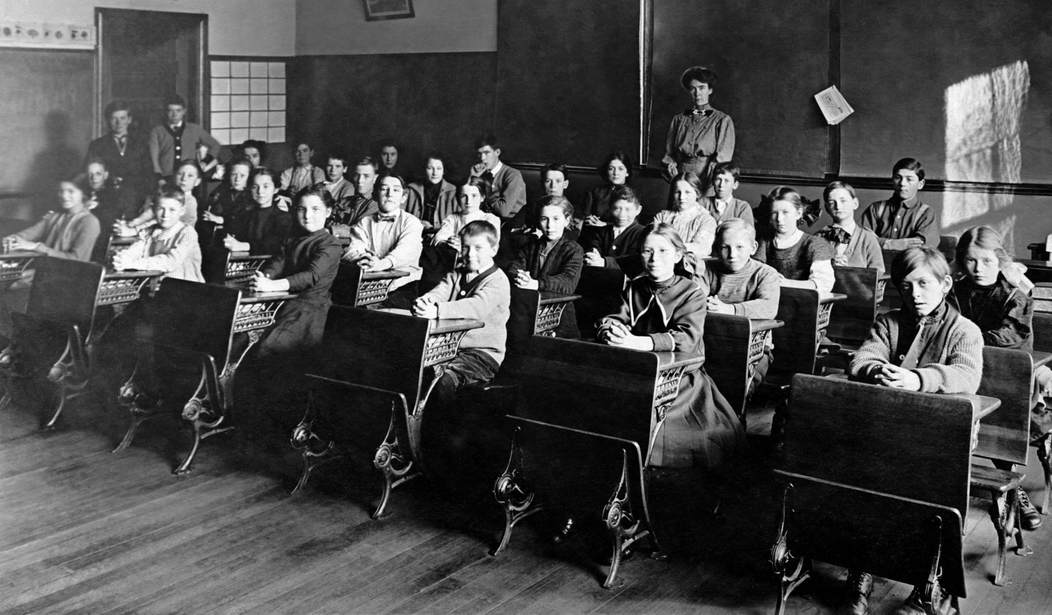Over at The Federalist, Stella Morabito detailed “13 ways public schools incubate mental instability in kids.” To be fair, her 13 points are absolutely spot-on. Among them, she observes that the bureaucratic modeling and sizing of schools and classrooms are “alienating” to the point of feeling prison-like; that schools are “breeding grounds for cliques” and “aggression”; and that curricula and administrations are “politicized” and promote “conformity” while ignoring a student’s family and private life. Morabito’s depiction is rather Orwellian, but not untruthful. However, her extreme conclusion, based in large part on the school experience of Florida shooter Nikolas Cruz, requires serious further examination for 99 percent of the parenting population. While the salacious headline fuels the anti-public education crowd, it also leaves one to wonder: Is my kid really going to go crazy simply because I send him to the local public school?
The answer is most likely no. Will your kid pick up on a lot of bad habits, including a gross indoctrination into groupthink? Well, honestly, that depends on your skills and involvement as a parent more than it does on the actions of their teachers and administrators. Having attended public school and grown wise to their nauseatingly bureaucratic nature at an elementary age, I can attest to the fact that the actions and behaviors of several rotten teachers (and students) drove me closer to, not further away from my parents. The difference between myself and my fellow students was simply that my parents didn’t trust the system more than they trusted themselves and their own child.
Public school was the training ground through which my mother encouraged me to respectfully question authority. If I heard something with which my conscience disagreed, I’d voice my opinion. If I was censured for doing so, she’d step in to make sure the administration was aware that this was unacceptable and that, most importantly, my parents were watching them. In fact, public school was an early civics lesson in the power of voters over their elected officials.
I also learned how to play the system to my advantage while attending public school. During the height of middle school hell, I studied my student handbook. Realizing I could take up to four sick days per quarter and still pass on to the next grade at the end of the year, my mother and I made a deal. I’d attempt a day’s attendance. If I was being treated poorly, or worse yet, bored out of my mind, I could simply go to the nurse at a certain time and tell her I had a headache and needed to go home. It worked every time.
Interestingly, Morabito notes that special needs students and students of faith (she limits this to Christianity in the sub-heading, but does note a generalized “hostility towards religion”) are especially prone to suffer in a public school environment. For many special needs students, public education is a mixed bag at best. The challenge many parents face is the ability to locate and afford better educators. This is often why special needs parents are among the most highly involved parents in a school district. The instances in which a school’s curriculum conflicts with a student’s religious values (i.e. sex ed classes) can usually be avoided by a simple parental note excusing the student from the class in question. (How do you think I got out of two semesters of health class and pursued an independent study instead?)
I’d also add gifted students to Morabito’s list of underserved demographics. Boredom reigns supreme at public schools. Yet, so do copious amounts of free time with which tech-savvy students can do anything from starting their own blogs to starting their own businesses. (It’s amazing what you can do with all the time you don’t spend doing homework you already finished in class.)
Morabito notes the rise of “school refusal,” a term pediatricians tie to an actual diagnosis of anxiety and depression. She balks at the growing number of psychiatric clinics designed to treat the condition, which is not technically a diagnosis. She notes that they are never willing to admit that public school is the problem, not the solution. However, she fails to note that children who are deemed to be suffering from school refusal are often experiencing anxiety and depression as a result of extenuating factors, including a family history of mental illness and/or a troubled home life.
While public school culture can be demoralizing for many students, ultimately that should not be seen as the sole causation of such extreme duress. In fact, if a child claims that school life is driving him or her to anxiety and depression, a parent ought to be asking why any public institution should hold such sway over their child’s psyche. Chances are it is because that child feels the school has more authority over them than they do over themselves, and that their parents trust school authorities more than they trust their own child.
Are public schools subpar? Yes. But, the average parent who neither can afford private education nor has the time to spend homeschooling their children shouldn’t be thrown into a panic. Instead, armed with the knowledge that public education is mediocre at best, they should be all the more motivated to play an active role in their child’s education. This means encouraging their child to think past what they’re being taught and to learn how to thrive independently instead of conforming to the system. Most importantly, this means putting the parent-child relationship above all else. Children shouldn’t be seeking out role models among teachers or peers; they should already be content with the ones they’ve been given at home.









Join the conversation as a VIP Member